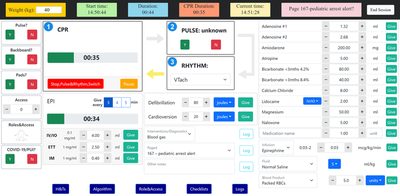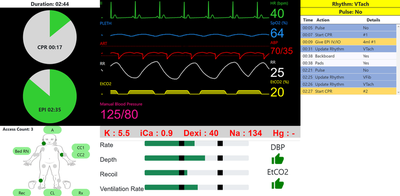Project Background and Objective
Poor quality cardiopulmonary resuscitation (CPR) is directly linked to detriments in patient morbidity and mortality[1]. In-hospital cardiopulmonary resuscitation events are often fraught with preventable harms; medication errors, systems issues and suboptimal performance by individuals and teams[2]. Despite advances in resuscitation continuous quality improvement (CQI) programs, in-hospital pediatric arrest survival rates remain low at a median of 36% [3]. While we know the features essential for a high-quality resuscitation, we do not know a singular approach to achieve these elements. The joint effort of the UIUC team lead by Prof. Lui Sha and the UChicago Medicine team lead by Dr. Priti Jani aims to develop a pediatric resuscitation guidance system that will uniformly improve the quality of resuscitation events in real-time by functioning as a dynamic cognitive aid, decision support tool and agent promoting adherence to resuscitation algorithms and CRM. We hypothesize the utilization of a pediatric resuscitation guidance performance system (GPS) during cardiopulmonary arrests will improve both adherence to guidelines as well as CRM exhibited by team performance.
Prototype
Developed a prototype dynamic electronic decision support tool with an associated visual display that increases adherence to Pediatric Advanced Life Support (PACLS) algorithms. This new prototype is facilitated with flexible multi-platform encapsulation compatibility, integrated with real-time simulation scenario input, well-documented requirements traceability and formal verification capability.


Clinical Evaluation
The PACLS guidance system prototype is under clinical evaluation in The University of Chicago Medicine, Comer Children’s Hospital Pediatric ICU simulation center, under supervision of Dr. Priti Jani. in a randomized, cross-over study to compare simulation-based team performance and adherence to resuscitation guidelines. The knowledge gained from this research will further inform the development of dynamic cognitive aids and decision support technology to improve the quality of resuscitation events and team performance in real-time. Prediction modeling may be used to guide clinical teams in real-time towards intra-arrest actions most likely to improve patient outcomes.
References
- Talikowska M, et al. Cardiopulmonary resuscitation quality and patient survival outcome in cardiac arrest: a systematic review and meta-analysis. Resuscitation 2015; 96:66-77.
- Perkins G, Boyle W, Bridgestock H, et al. Quality of CPR during advanced resuscitation training. Resuscitation 2008; 78:59-65.
- Yang, Chih-Wei, Yen, Zui-Shen, et al. A systematic review of retention of adult advanced life support knowledge and skills in healthcare providers. Resuscitation 2012; 83: 1055-1060.